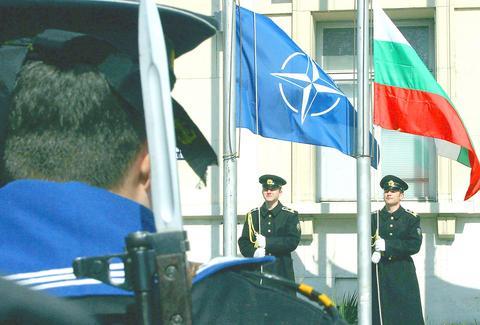The flags of seven new East European members were raised at NATO headquarters yesterday as foreign ministers prepared to confer on a growing list of global trouble spots where overstretched forces are involved.
"At the dawn of a new century, the entry of the seven new members extends the area of stability of our continent," said Italian Foreign Minister Franco Frattini. "It ... confirms that the divisions of the past have been overcome."
The banners of formerly communist Bulgaria, Estonia, Latvia, Lithuania, Romania, Slovakia and Slovenia were hoisted in the courtyard of the sprawling low-rise NATO complex in a Brussels suburb four days after they joined, raising membership to 26.

PHOTO: AP
The three Baltic states are former Soviet republics whose incorporation into the Western alliance has riled Moscow.
But, after much deliberation, Russian Foreign Minister Sergei Lavrov agreed to meet NATO counterparts later yesterday in what Western diplomats saw as a signal of acceptance.
"It's a historic moment. For 50 years we were occupied by the Russians. We've never been as safe as we are today," said Lithuanian warrant officer Algirdas Nakvosas, resplendent in a green dress uniform, as he watched the flags go up.
NATO warplanes began air patrols over the Baltic states as soon as they acceded on Monday, despite complaints from Moscow.
Former Lithuanian president Vytautas Landsbergis, a hero of independence from the Soviet Union in 1991, told state radio: "People have been trying to tell us that the Cold War is over ... but there are many facts showing us that this is an illusion.
"I speak not of the Russian people, but in the minds of Russian leaders nothing is different from 10 or even 15 years ago. The Cold War against the Baltic States continues."
US Secretary of State Colin Powell said there was no reason for "heightened nervousness" over Russia's unease.
"I don't sense that the Russians will find it necessary to counter this move with anything that would be either provocative or destabilizing or dangerous," he said in remarks released by the State Department yesterday.
Bulgaria, Romania and Slovakia once formed part of the Soviet-led Warsaw Pact, NATO's foe which collapsed in 1991. Slovenia once belonged to non-aligned but communist Yugoslavia.
In their talks, the ministers were to discuss the slow delivery on pledges to expand security in Afghanistan, which won record aid from donors this week but is still threatened by a resurgent drug trade, warlordism and guerrillas.
"I would like to see additional forces go in there over the next couple of months in order to secure the country for the elections that are going to be held in September," Powell said.
Aid groups have criticized NATO for planning to set up military reconstruction teams in relatively stable areas of the country and failing to address major security problems.

MAKING WAVES: China’s maritime militia could become a nontraditional threat in war, clogging up shipping lanes to prevent US or Japanese intervention, a report said About 1,900 Chinese ships flying flags of convenience and fishing vessels that participated in China’s military exercises around Taiwan last month and in January have been listed for monitoring, Coast Guard Administration (CGA) Deputy Director-General Hsieh Ching-chin (謝慶欽) said yesterday. Following amendments to the Commercial Port Act (商港法) and the Law of Ships (船舶法) last month, the CGA can designate possible berthing areas or deny ports of call for vessels suspected of loitering around areas where undersea cables can be accessed, Oceans Affairs Council Minister Kuan Bi-ling (管碧玲) said. The list of suspected ships, originally 300, had risen to about 1,900 as

Right-wing political scientist Laura Fernandez on Sunday won Costa Rica’s presidential election by a landslide, after promising to crack down on rising violence linked to the cocaine trade. Fernandez’s nearest rival, economist Alvaro Ramos, conceded defeat as results showed the ruling party far exceeding the threshold of 40 percent needed to avoid a runoff. With 94 percent of polling stations counted, the political heir of outgoing Costa Rican President Rodrigo Chaves had captured 48.3 percent of the vote compared with Ramos’ 33.4 percent, the Supreme Electoral Tribunal said. As soon as the first results were announced, members of Fernandez’s Sovereign People’s Party

MORE RESPONSIBILITY: Draftees would be expected to fight alongside professional soldiers, likely requiring the transformation of some training brigades into combat units The armed forces are to start incorporating new conscripts into combined arms brigades this year to enhance combat readiness, the Executive Yuan’s latest policy report said. The new policy would affect Taiwanese men entering the military for their compulsory service, which was extended to one year under reforms by then-president Tsai Ing-wen (蔡英文) in 2022. The conscripts would be trained to operate machine guns, uncrewed aerial vehicles, anti-tank guided missile launchers and Stinger air defense systems, the report said, adding that the basic training would be lengthened to eight weeks. After basic training, conscripts would be sorted into infantry battalions that would take

GROWING AMBITIONS: The scale and tempo of the operations show that the Strait has become the core theater for China to expand its security interests, the report said Chinese military aircraft incursions around Taiwan have surged nearly 15-fold over the past five years, according to a report released yesterday by the Democratic Progressive Party’s (DPP) Department of China Affairs. Sorties in the Taiwan Strait were previously irregular, totaling 380 in 2020, but have since evolved into routine operations, the report showed. “This demonstrates that the Taiwan Strait has become both the starting point and testing ground for Beijing’s expansionist ambitions,” it said. Driven by military expansionism, China is systematically pursuing actions aimed at altering the regional “status quo,” the department said, adding that Taiwan represents the most critical link in China’s